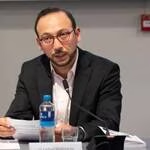We welcome applications from PhD candidates interested in conducting research in line with the subject areas covered by the Governance, Law and Social Justice research group.
Take a look at the type of research conducted by our faculty and the PhD supervisions they are interested in. More information about the ISS PhD programme and how to apply can be found on the ISS PhD Programme page.
Research expertise
Professor Arts’s research interests span the broad realm of ‘international law and development’. She focuses on studying law as a major factor in processes of development and/or transition, either as an instrument of change or as a vehicle for guarding the status quo.
PhD supervision
Professor Arts has a long-standing experience in supervising PhD projects and in particular welcome PhD supervisions in the following themes:
- Broad realm of (international) law and (sustainable) development
- International human rights law, children’s rights, human/child rights-based approaches to development
- Climate change and human rights, and EU development cooperation.
Research expertise
Associate Professor Jeff Handmaker is an adjunct faculty member in the School of Law, University of the Witwatersrand and in the School of Law, Leiden University. He conducts research on legal mobilization with his colleagues. They explore the potential of law to support progressive, rights-based structural change in a variety of contexts and themes. This includes a project at the Netherlands Institute for Advanced Studies (NIAS) in Amsterdam, funded by the Royal Dutch Academy of Sciences (KNAW), around a Theme Group on Legal Mobilization: Analyzing Law-Based Advocacy. Also with others, Jeff Handmaker currently support a Legal Mobilization Platform that involves a wide consortium of scholars and practitioners.
Dr Handmaker’s long-time association with South Africa (and Southern Africa) is maintained through the position as a senior research fellow in the Faculty of Law at the University of the Witwatersrand in Johannesburg, South Africa and as an Editor (formerly Editor-in-Chief) of the South African Journal on Human Rights. In addition to his academic work, he holds various ancillary positions, including the Advisory Board of the Public Interest Litigation Project (Amsterdam) and International Lawyers (Geneva).
PhD supervision
Dr Handmaker has a long-standing experience in supervising PhD projects and, in particular, welcomes proposals from prospective candidates where his role in the supervision of the candidate would bring added value to the research project:
- Accountability for international crimes and the (lack of) protection for refugees and other migrants (in South Africa, the Netherlands, broader Europe, and elsewhere)
- Legal mobilization taking a wide range of legitimate, law-based forms and includes, but by no means limited to, strategic litigation.
Research expertise
Professor Hilhorst mainly focuses on aid-society relations: studying how aid is embedded in the context, impacts governments, and society, and is shaped by the various actions of actors in and around programs for protection, service delivery, and capacity development. She specializes in the intersections of humanitarianism with development, peacebuilding, and gender relations.
Professor Hilhorst's research programs have taken place in disaster, conflict, and fragility settings, including Afghanistan, Angola, Burundi, the Democratic Republic of Congo, Ethiopia, the Philippines, Rwanda, South Sudan, and Sri Lanka. Currently, her main research program concerns humanitarian governance: accountability, advocacy, and alternatives. She also recently completed a program on 'when conflict meets disaster' that studied disaster governance in high-conflict, low-conflict, and post-conflict societies.
PhD supervision
Professor Hilhorst has supervised 32 PhD candidates (9 ongoing and 23 completed) and welcomes PhD candidates work on these topics in different areas of the world:
- Nexus between peace building and humanitarianism
- New forms of disaster governance or what to do when disaster happens in the midst of conflict
Research expertise
Professor Hout’s research interests are related to issues in the political economy of governance and development, as well as on aspects of international cooperation (mainly development assistance policies and regionalism). He has also worked on governance issues in Suriname and Uganda.
PhD supervision
Professor Hout welcomes PhD supervisors wishing to focus on the following themes:
- Political economy dimensions of governance and development
- Questions related to international cooperation and regionalism
Research expertise
Assistant Professor Jayasundara-Smits research interests broadly cover the inter-connections of violent conflict and development. More specifically, she is interested in issues and topics such as armed Conflicts, Post-War Transitions, Foreign and Security Policy, Politics, state-building and security governance. Her main geographical areas of research are Asia, Sri Lanka in particular and Europe.
PhD supervision
Dr Jayasundara-Smits is interested in supervising PhD and post-doctoral research projects on the above-mentioned subject areas and specifically on the following themes:
- Dynamics of armed conflicts (civil and inter-state wars)
- Challenges for post-war transitions
- European Union's foreign and security policy towards armed conflicts and post-war transitions
- Visual politics of war, peace and violence
Research expertise
Assistant Professor Kasli is an interdisciplinary scholar with research and teaching experience that transcend the disciplinary boundaries between political science, sociology, geography and socio-legal studies, with a thematic focus on mobility, migration and citizenship, and a regional expertise on Turkey, MENA and Europe.
PhD supervision
Dr Kasli welcomes PhD students interested in any of the broad areas of research described above and with interest in incorporating transdisciplinary approaches and multiple methods in their research:
- The interplay between border, migration and citizenship regimes
- Extraterritorial state power, transnational ties and diaspora politics
- Politics and policies of diversity indifferent urban contexts and cross-border regions
- Legal consciousness, mobilization and framing with a focus on migrants’ and minority rights
- Urban borderscapes are embedded in a global and transnational political field of power from a decolonial and degrowth perspective
Research expertise
Associate Professor Karim Kniou’s research interests focus on the political economy of governance with an emphasis on EU-Mediterranean relations , varieties of capitalism, institutional analyses, politics of crisis management and political ontology. He also has research interests related to politics of gas, EU democracy promotion programs and Lebanese politics. He is the author of The European Union’s Mediterranean Policy: Model or Muddle? A New Institutionalist Perspective (Palgrave Macmillan 2013), and The South China Sea and Asian Regionalism: A Critical Realist perspective-with Thanh Dam Truong (Springer 2016).
PhD supervision
Dr Kniou is interested in supervising PhD candidates who wish to focus on following themes:
- Institutional analyses, varieties of capitalism(s)
- The political economy of crisis and learning
- Neoliberalization processes
- Politics of social ontology
- Euro-Mediterranean and Middle Eastern politics
Research expertise
Assistant Professor Rodrigo Mena’s research agenda currently focuses on the changes that the humanitarian aid and disaster sectors are undergoing considering the compound effects and challenges of climate change, protracted crises, and displacement. He is also interested in the ethical, safety and security aspects of research (remote, in-situ/fieldwork and desk research), and how these aspects translate into methodological practices.
PhD supervision
Dr Mena welcome PhD researchers interested in researching:
- Humanitarian aid and disaster risk reduction, particularly in relation to the topics mentioned above
- Understanding the processes of disaster risk creation (DRC) vis-à-vis disaster risk reduction (DRR)
- The role and use of technology in humanitarian aid and disaster governance (response and prevention)
- The development, humanitarian, and peace/peacebuilding nexus
- The relationship between conflict, disasters and humanitarian aid
Research expertise
Dr Mukhtarov is specialized in interpretive policy analysis and environmental policy. He is fascinated by the politics of knowledge, problem framing, knowledge pluralism, and the role of context in shaping (environmental) policy. Farhad studies the intersection of public policy and the environment in the context of international development. Broadly speaking, he is interested in understanding the role of knowledge in politics, especially in a transnational context where global policy ideas penetrate national and local policy practices.
PhD supervision
Dr Mukhtarov is open to opportunities to supervise PhD researchers whose topics falls within one or more of the following broad themes:
- Policy Mobility, Translation and Discourses - Policy ideas and models travel across various borders (often from Global North to Global South). By focusing on policy practices, documents and meeting this process can be made intelligible.
- Knowledge Pluralism and Policy (Institutional) Design - Projects that are interested in how policy-makers and public managers can make use of multiple ways of knowing in public policy and governance. Scientific knowledge is one type of knowledge, there is indigenous knowledge, knowledge based on rituals, practices, and values. They all are valuable and need to be included in the policy-making process. The big question is how.
- Behavioural Approaches to Public Policy - Projects that are interested in the role of emotions and nudging in changing environmental (as well as policy) attitudes and promoting sustainable public policies. The research approaches emotions and behavioural science from a public policy perspective and asks questions about the transition to sustainability through the so-called 'libertarian paternalism'
Global Water Governance and Neo-liberalism - The rise of neo-liberalism in international aid, aid and trade and, arguably, global water governance, raises serious issues around effectiveness, equity, fairness and power relations that need to be researched and critically discussed. Within this line of inquiry, the research will seek to understand the role of branding, networking and soft-power leveraging in the global field of water governance
Research expertise
Dr Nem Singh's research falls into four main areas of inquiry:
- political economy of industrial policy and development planning in the global south
- politics and governance of natural resources
- citizenship and social movements perspectives on democratization
- the developmental consequences of China’s engagement with the global South
PhD supervision
Dr Nem Singh welcomes post-doctoral fellows and PhD students interested in the following themes:
- Political economy of natural resources
- Protest politics and citizenship in Latin America and Asia
- Critical approaches to the green technological transition
Research expertise
Dr Tankha's research focuses on development policies and governance, in particular on issues related to infrastructure (electric power and water) and public sector management. He combines research with policy advice, symbiotically generating data and ideas which can help policymakers approach wicked problems with more nuanced approaches. He has worked intensively on four continents, and has substantial country experience in Brazil, Georgia, India, Netherlands, and the United States.
PhD supervision
Dr Tankha is interested in supervising PhD researchers who wish to focus on the following themes:
- Development policy and public sector management
- Infrastructure development (electric power and water & sanitation)
- Privatization and regulation
- Governance of climate change mitigation and adaptation in developing countries
Research expertise
Assistant Professor Nanneke Winters’s ethnographic work has evolved around the role and experience of im/mobility in people’s lives, in Central America and elsewhere. More specifically, she has focused on families’ cross-border labour and carework; migrant trajectories and illegalization; and the interplay between displacement and emplacement. Theoretically and methodologically, she builds on anthropology, feminist geography and critical development studies.
PhD supervision
Dr Winters welcomes PhD students with an interest to work on the following themes:
- Issues related to migration, im/mobility and development
- Transnational families and translocal livelihoods
- Migration industries and migrant trajectories
- Borders and border communities
- Displacement and place-making; and ‘Othering’











